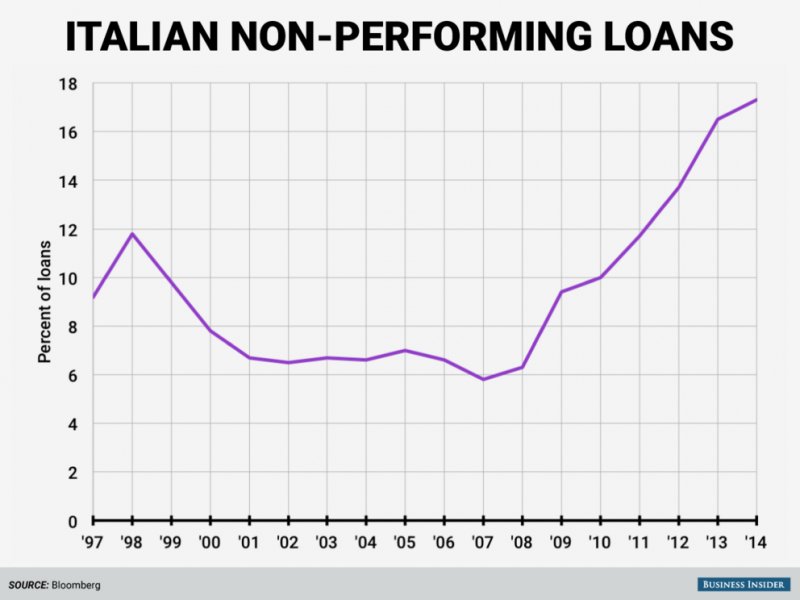After a long weekend in the US and headlines from the Bank of England warning about financial stability in the UK, markets are seemingly obsessed with problems in the Italian banking system.
A note from JP Morgan, which comes to us from ZeroHedge, shows the rush of negative headlines related to the Italian banking system coming across the tape Tuesday morning.
Tweet Embed:
https://twitter.com/mims/statuses/750301287011483648
JPM pic.twitter.com/tlSpFZwLaM
A big feature from The Wall Street Journal's Giovanni Legorano captures most of the concerns with Italy's banking system and the political turmoil it appears liable to set off.
In short, Italian banks are loaded with bad debts, as Legorano notes 17% of bank loans in Italy are "sour," a level nearly 10 times the bad loans outstanding in the US banking system (5%) at the height of the financial crisis.
Also at issue is that Italy's banking system, as Legorano writes, tends to "focus on plain-vanilla lending activities" — things like holding deposits, and lending to businesses and homeowners — as opposed to investment banking, trading, or asset management which are more lucrative endeavors.
This leaves Italy's banking system particularly sensitive to the record-low interest-rate environment as safer banking activities will more closely hug the benchmark interest rates set by policymakers. In Europe, interest rates are negative.
Problems within Italy's banking sector could also cause a political headache for prime minister Matteo Renzi, who faces a referendum vote on reform measures in October. Renzi has promised to quit if he loses the vote, Bloomberg notes.
Of course, issues surrounding the Italian banking system are not strictly new, and in the last year shares of Unicredit (MI:CRDI) — Italy's only bank considered globally significant — and Banco Monte dei Paschi di Siena, the oldest bank in the world, are down over 60%.
In April, reports surfaced that the government could step in to shore up the banking system; days later the government got executives, insurers, and investors to put €5 billion into a rescue fund for Italy's weakest banks. Tuesday morning, a report from Bloomberg said Italy is looking to inject up to €3 billion into Monte de Paschi; this would be the bank's third bailout since the financial crisis.
In May, Deutsche Bank (DE:DBKGn) wrote in a note to clients that Italy posed the biggest risk to markets despite the fact that at that time the market was looking past issues in Italy as the Brexit vote loomed. And over the weekend, analysts at Citi also took this view, writing:
"Outside of the UK, the next major political event may be a referendum in Italy on Senate reform, as PM Renzi’s political future may be tied to the outcome of the referendum. It raises the risk of Renzi-exit at a time when the upstart 5-Star Movement are riding high in the polls and with Italy having among the highest levels of Eurosceptic sentiment."
Following the June 23 Brexit vote, markets have been unsettled but, all things considered, the reaction has not been as dramatic (save for the first 24 hours) as some might have predicted.
But as we've moved past the initial shock and the early stages of digesting how Brexit could impact markets in Europe and around the world, it seems that in Italy markets have found their first knock-on impact to worry about.
